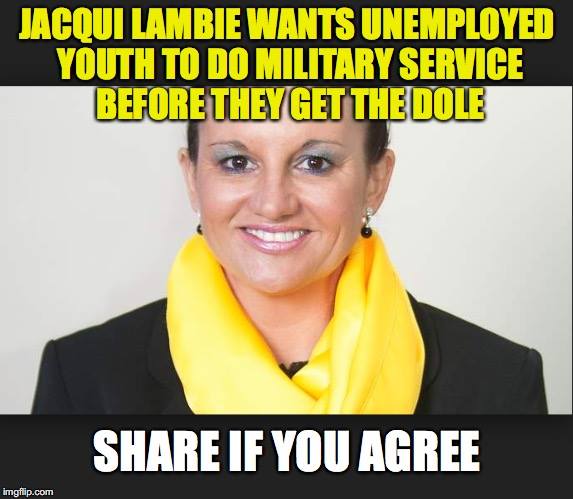So, someone shared the following pic on Facebook:

Some things are a red rag to a bull. I replied:
Um, Jacqui Lambie has been out of parliament since 2016, but more importantly, this is a stupid idea. Perhaps run it past the ADF? They may not be all that keen on an influx of 100,000+ youth to house and train! (Spoiler: they hate this idea. ADF is very selective about who they take.)
Unemployment is rarely personal failure. We all know people who don’t want to work, but the overwhelming majority do, and cannot find it. This country has over 750,000 unemployed and around 150,000 advertised jobs. You can’t tell me they’re all dole bludgers. That scale of wasted labour is just hopeless economic management.
They replied:
This post is not claiming unemployment as person failure? And what she said a number of years ago isn’t the issue. The idea of requiring unemployed youth to do military service (army reserves could be an option) could give this demographic, experiences and better equip them for their future and help them develop. (It would also get them away from technology long enough to learn to think for themselves, and develop their brains, decision making, self discipline etc). If you work with people on Youth allowance/Newstart it gives you a perspective that political statistics don’t!
All well and good, but there is a cost to implementing such a programme that needs to be considered. It’s asinine to expect that the ADF (or Reserves) can just accommodate this number of people without provision of resources. And why on earth would ADF want to deal with 100K youth who want a real job, and simply are not army material? It’s just not in anybody’s best interest. EXCEPT THOSE WHO VIEW UNEMPLOYMENT AS PERSONAL FAILURE and wish to make that state even more unpleasant than it already is, based on the misguided idea that you can penalise people into jobs.
There are plenty of useful things that people who don’t have a job could be paid to do that don’t involve military service.
There is a cost involved in any case! I believe it is in the countries interest to have the younger generation resourced to be productive members of society. If they aren’t then the future generations will were the consequences. I can’t speak for the ADF as I am not qualified to do that.
Like any large scale change it would be wise to do it in increments, not all at once ?
As we are discussing this, I need to clarify, I do not see unemployment as a personal failure (you don’t have to yell).
If there are plenty of useful things that people could be paid to do, were would the money come from to pay them?
To answer your second question “where would the money come from?” first, it comes from the same place all money comes from. The federal government authorises the spending and Treasury instructs the RBA to increase the numbers in various people’s accounts. Money is the one thing the federal government can never run out of, any more than Coles could run out of Fly-Buys. Of course they could issue too much, but they can also issue not enough, and both scenarios create problems: too much creates inflation, too little creates unemployment.
But to your main question, consider that the unemployed are already on the federal payroll. Instead of paying them a pittance to do nothing, we would be far better off paying them a decent wage to do something useful. There’s no shortage of worthwhile things that could be done to improve our communities: things that no private business will do because there’s no profit in it.
Imagine if you went to the Mayor of Dubbo and said, “if you had a standing army of people willing and ready to work and the federal government would pay them $20/hour on your behalf, what could you do to improve the Dubbo community?” I daresay it wouldn’t take long to come up with ideas. Obvious ones are land care, aged care, child care, but there are plenty more community programmes and other services that we can provide each other.
Anyone who truly wants to work will take that offer and be found work that suits them and allows them to use or develop their skills. Anyone who truly wants to be a layabout still has the choice to do that too. You’d soon see how many people really want to be layabouts.
All these people now earning a decent wage have the opportunity to participate in the economy, spending those wages (which in turn becomes the wages of others), paying taxes etc. That increased demand for goods and services leads to more private sector employment opportunities, which draws people out of this Job Guarantee programme again.
This is not something I’ve dreamt up, by the way. It’s been developed, researched and costed over several decades, by serious economists. Yes, paying people who want to work and cannot find private sector employment will cost the government money, but so does paying unemployment benefits, and so does dealing with the results of poverty: crime, malnutrition, domestic violence, alcohol and drug dependence, homelessness and so on.
I’ll finish with this last point. How many people leave rural and regional areas for the big cities in search of work, by necessity and not by choice? Instead of talking about forcing migrants to come to regional areas, what if the federal government offered paid work to regional locals who want it?
If you’re interested I can post some links to more material on these ideas.
Such as: A Job is the Best Form of Welfare, by Joe Zabar, the deputy CEO of Catholic Social Service of Australia.

Hang on a minute. The term ‘printing money’ should be avoided: it refers to fiscal operations that applied under a gold standard, where the size of the economy was constrained by the amount of gold the government held (or the currency your currency was pegged to). These days all money is printed.
The laws of supply and demand suggest that prices increase if demand is greater than supply, and vice versa. But defining the demand for money itself is not that straightforward, is it? It’s not easy to conceive a situation where the demand for money is less than the available supply.
Furthermore, assuming businesses can adopt a monopolist position and just charge more for the same thing is not valid. Unmet demand leads to greater supply, as new businesses enter the market, and existing ones ramp up production to take advantage. If widgets are profitable, selling more widgets = more profit. Indeed, increased production can lead to lower per-unit cost of production.
Increasing the amount of money increases the aggregate spending capacity. That will increase aggregate demand, and increased production will follow. That leads to more employment, as firms need more workers to make more stuff.
It’s a virtuous cycle, until you run out of the fixed resources, be they raw materials or labour. That’s when you get inflation: when there’s no more idle labour and production to be put into service, and any further injection of cash into the economy will lead to too many dollars chasing too few goods. So whilst adding $200-$400BN to the net financial assets of the economy is not endlessly sustainable, the progressive nature of income taxes will attenuate that spending and drain a significant portion away again.
All that said, I don’t agree with the UBI concept. But for entirely different reasons, and this post is long enough already.